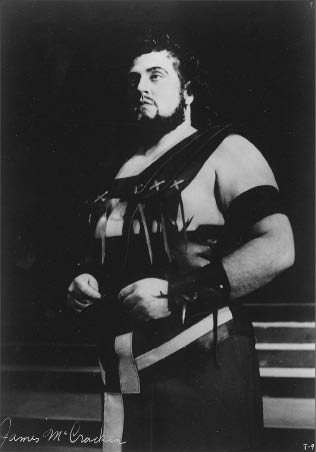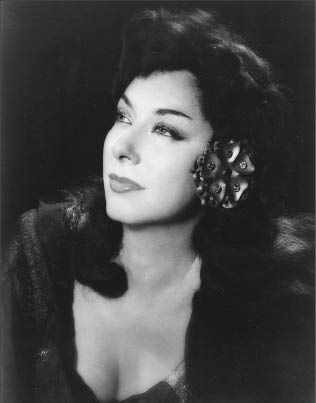The Temple Shall
Not Fall Tonight

Some directors would have you believe that operas are little more than obstacles to their brilliant concepts. Staging Rigoletto à la Planet of the Apes, for example. While that was never my style, I must admit that I was associated with a radical staging of Camille Saint-Saëns’s Samson and Delilah. This was probably the one and only time that Samson died of natural causes. It wasn’t my fault.
Any Sunday School student knows how the story of Samson and Delilah ends: our hero Samson, held captive in a Philistine temple, uses the last of his strength to pull down the columns to which he’s been chained. The temple collapses, killing him as well as his decadent enemies. At least that’s how it’s supposed to end. As director, I had every intention of making that happen.
It was 1961, my first season at Zurich Opera. We had mounted the production specifically to have the husband and wife team of tenor James McCracken and mezzo-soprano Sandra Warfield perform the title roles. Things started well. But Mary Davenport, a mezzo-soprano under house contract with Zurich, wasn’t entirely happy with the situation. Feeling that she was entitled to right-of-first-refusal for any role, she filed a complaint. As part of the resolution she was assigned a few performances. Now we had a new problem: McCracken was only interested in performing with his wife. If she wasn’t going on, he wasn’t going on.

James McCracken as Samson.
For the nights when Mary performed we had to find a substitute Samson. On one occasion we engaged a reputable tenor from Paris. I had never worked with this gentleman before, but he certainly looked the part. Standing about six-and-a-half feet tall and weighing over 250 pounds, he towered over everyone. As for Mary, she was the spitting image of Margaret Dumont, the relentlessly clueless grande dame from the Marx Brothers’ films. So on this particular night, Saint-Saëns’s perfumed, sensual opera would be headlined by the Incredible Hulk and Margaret Dumont.
The cast included Randolph Symonette, a noted American bass-baritone, as the High Priest of Dagon. On the day of the performance he received a telegram from the Metropolitan Opera in New York City, engaging him to cover the great bass Otto Edelmann as Wotan in Richard Wagner’s monumental Der Ring des Nibelungen. More than a fine opportunity, this was also something of an honour. Every opera singer dreams of being contracted for a difficult role at a major house. Understandably, Randolph was a happy man. And, as is often the case with happy men, he needed to celebrate.
Tucked away in the basement of Zurich’s opera house is an employees-only canteen with a fully stocked bar. This isn’t unusual — you’ll find one in many opera houses, especially those in Europe. I can’t say for sure how early Randolph parked himself in the canteen, but I’m fairly certain that he didn’t follow the old German dictum, “Kein bier vor vier” (“No beer before four o’clock”). And I’m also pretty sure that he kept the party going through makeup. And costuming. And the performance itself.
One of Randolph’s big moments as the High Priest came during the last act bacchanale, which takes place in the Temple of Dagon. Here, the Philistines are celebrating their victory over Samson and his people while the High Priest and Delilah perform exotic rituals. As the scene unfolds, the revellers work themselves into a bloodthirsty frenzy before Samson musters his final act of resistance, literally crashing their party. It’s a huge moment, calling for a densely populated stage: in addition to the principal artists, we had over a hundred choristers and dozens of ballet dancers.
The set — designed by Georges Wakhévitch, who did a lot of film work with celebrated directors such as Peter Brook and Jean Cocteau — was a wonder. Terrifically ornate, it had columns and walls that could collapse realistically. Its centrepiece was the altar of Dagon, which featured a working brazier. I arranged for the High Priest and Delilah to have a chalice filled with a kind of theatrical powder. During the bacchanale, whenever “Dagon se révèle” — the recurring phrase of praise for their pagan god — was sung, one of them was to pour a bit of this powder into the brazier, resulting in a localized explosion, a flash of flame, and a puff of white smoke. Very dramatic.
Musically, the scene is not particularly difficult, but, as it is a canon, it does have an interlocking quality: the High Priest starts, followed by Delilah, followed by the chorus. If one singer misses something, the next singer can get thrown off, and so forth. Even with just a modest miscalculation there is a real possibility of a rather unwelcome chain reaction. And here we had over a hundred singers, all of them listening for certain cues. Conductor Sam Krachmalnick, an American known as much for his cursing abilities as his musical abilities, was our man in the orchestra pit.
By the time we got to this point in the opera, Randolph was clearly feeling no pain. From the wings, I could see him careening about the stage. He was becoming a bit sloppy musically, and I could sense rumblings from the pit as Sam worked overtime to hold things together.
We approached the crucial moment. As directed, one of the ballet dancers picked up the sacred chalice and showed it around the stage to the “oohs” and “ahs” of the Philistines. It was at this point that the words “oh no” first crossed my mind. The dancer’s job, you see, was to finish these movements by handing the cup to the High Priest with a dramatic flourish. Which he did.
Randolph received the chalice with a crazed look in his eyes. Now my brain was like an old-fashioned stock ticker chugging out a steady tape of “oh no”s. Randolph teetered to the altar, raised the chalice high — by this point I was probably yelling “oh no” — and then unceremoniously dumped the entire contents into the brazier.
There was a loud boom, a burst of flame, and a cumulonimbus of white smoke. In a way, Randolph’s timing was remarkable. He had bombed the stage at the very moment when he was supposed to begin the “Dagon se révèle” canon. Instead of singing, Randolph began to giggle hysterically. Stunned, Delilah missed her entrance. Even more stunned, the chorus missed its entrance. In the pit the playing began to go awry, causing the first audible cursing of the night from Sam.

Sandra Warfield as Delilah.
The prompter, momentarily disoriented and inundated with a confusion of sound, flipped helplessly through the score. Not that anyone was looking at her. Onstage people stumbled, coughed, and squinted through the smoke; it looked like news footage from a war zone. Sam was red in the face by this point, screaming out a mixture of cues and the most exquisite profanity, which, thankfully, was all in English; the audience, while familiar with the language, could make neither heads nor tails of Sam’s particularly unorthodox brand. Margaret Dumont stood absolutely stock-still, practically in shock. The Incredible Hulk had enough presence of mind to realize that, if nothing else, the opera had to end with the temple coming down. Gripping the exclusively decorative chains connected to the columns of the set, he pulled and pulled. But by this point the stage manager had completely lost his place, meaning that the crew, which was waiting for a cue, missed the collapsing of the temple. The Incredible Hulk yanked frantically but futilely on his chains until the orchestra mercifully stopped playing, somewhere in the vicinity of the written ending. The temple hadn’t fallen. Our performers gave the audience a bewildered look as the curtain came down fast. Standing helplessly in the wings, I had no idea what to do.
Fortunately the audience knew what to do. Everyone laughed and laughed and laughed. Our drama had turned into a farce.
As for Randolph, he ended up bringing some of the farce along with him to the Met. On the night of one of the Ring performances he was standing by ready to step in for Edelmann if needed. Once the curtain had risen and Edelmann had started, however, he must have figured his day was over. He retired — surprise, surprise — to the canteen. But by the end of Act Two, Edelmann was indisposed and the call went out for the cover. After being hurried through costume and makeup, Randolph was positioned in the wings for his first entrance. By this point he was again feeling no pain. If you’re thinking, how is that possible? Wasn’t he in the canteen for half of an opera? Remember, we’re talking about Wagner. Some of his acts are longer than other composers’ entire operas.
At any rate, Randolph made his entrance and sang out, “Wo ist Brünnhilde?” Alas, this was about all he could remember. He sputtered along for just a few minutes until, for the first time in the history of the Metropolitan Opera, the curtain fell in the middle of an act.